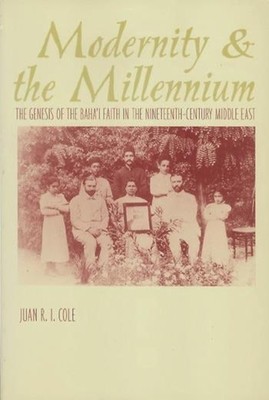
- We will send in 10–14 business days.
- Author: Juan Cole
- Publisher: Columbia University Press
- ISBN-10: 0231110812
- ISBN-13: 9780231110815
- Format: 15.4 x 22.9 x 1.6 cm, minkšti viršeliai
- Language: English
- SAVE -10% with code: EXTRA
Reviews
Description
Modernity and the Millennium is the first book to chart responses in the Muslim Middle East to modernity through an examination of the evolution of the Baha'i faith - a millenarian movement led by the nineteenth-century Iranian prophet Baha'u'llah ("the Glory of God"). This volume illuminates the complexity and ambiguity that characterized the changing relationship of Baha'u'llah and his followers to modernity. The insights presented here illuminate not only the genesis of a new world-religion but also important facets of Middle Eastern - particularly Iranian - social and cultural shifts in the nineteenth century. Drawing on the work of Habermas, Giddens, Touraine, and Turner, among others, Juan R. I. Cole considers some of the ways in which Middle Eastern society was affected by five developments central to modernity: the lessening entanglement of the state with religion, the move from absolutism to democracy, the rise of sovereign nation-states, the advent of nationalism, and the women's movement. He explores the Baha'i response to religious toleration, democracy, and greater rights for women and their "utopian realist" critique of nationalism, militant Jacobin secularization, industrialized warfare, genocide, oppression of the poor and working classes, and xenophobia.
EXTRA 10 % discount with code: EXTRA
The promotion ends in 23d.01:33:40
The discount code is valid when purchasing from 10 €. Discounts do not stack.
- Author: Juan Cole
- Publisher: Columbia University Press
- ISBN-10: 0231110812
- ISBN-13: 9780231110815
- Format: 15.4 x 22.9 x 1.6 cm, minkšti viršeliai
- Language: English English
Modernity and the Millennium is the first book to chart responses in the Muslim Middle East to modernity through an examination of the evolution of the Baha'i faith - a millenarian movement led by the nineteenth-century Iranian prophet Baha'u'llah ("the Glory of God"). This volume illuminates the complexity and ambiguity that characterized the changing relationship of Baha'u'llah and his followers to modernity. The insights presented here illuminate not only the genesis of a new world-religion but also important facets of Middle Eastern - particularly Iranian - social and cultural shifts in the nineteenth century. Drawing on the work of Habermas, Giddens, Touraine, and Turner, among others, Juan R. I. Cole considers some of the ways in which Middle Eastern society was affected by five developments central to modernity: the lessening entanglement of the state with religion, the move from absolutism to democracy, the rise of sovereign nation-states, the advent of nationalism, and the women's movement. He explores the Baha'i response to religious toleration, democracy, and greater rights for women and their "utopian realist" critique of nationalism, militant Jacobin secularization, industrialized warfare, genocide, oppression of the poor and working classes, and xenophobia.


Reviews